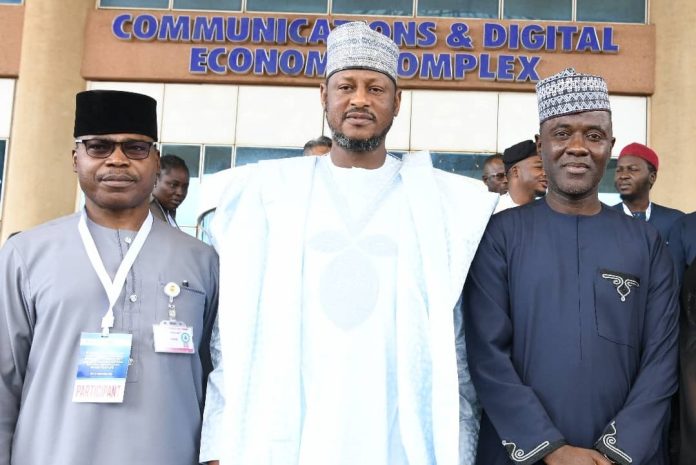By Anthony Emeka Nwosu
At the Nigerian Communications Commission (NCC) Digital Economy Complex in Mbora, Abuja, industry leaders, policymakers, and state representatives gathered this week for a crucial business roundtable themed “Right of Way and Protection of Broadband Infrastructure – The Road to Success in Broadband Investment and Connectivity.”
At the heart of the conversation was a powerful question posed by the Executive Vice Chairman of the NCC, Dr. Aminu Maida:
“How much is an hour of connectivity worth?”
That question, he said, defines the urgency of Nigeria’s digital journey — where broadband access is no longer a luxury but a lifeline for commerce, education, security, and national development.
The Value of Connectivity
Dr. Maida painted a vivid picture: from the industrialist in Enugu closing an international deal to the entrepreneur in Lagos managing an online store or the security agent relying on live data feeds — connectivity, he said, is “the quiet enabler” of productivity and progress.
He drew historical parallels, noting that just as steam, rail, and electricity powered the industrial age, data and broadband are now the engines of modern prosperity. “Those who seize the moment prosper; hesitation carries a heavy cost,” he said.
Nigeria, with over 200 million people and a median age of 18, stands on the cusp of a transformation that could rival the digital booms of India and Rwanda. With broadband penetration at 48.81% as of August 2025 — representing over 140 million internet users — Maida stressed that expanding access is directly tied to national growth.
“A 10% increase in broadband penetration can drive approximately 1.38% GDP growth in developing economies,” he said. “Imagine what 20%, 30%, or 40% could do — more jobs, more innovation, more prosperity.”
Progress and Policy Wins
Under the leadership of President Bola Ahmed Tinubu and the Minister of Communications, Innovation and Digital Economy, Dr. Bosun Tijani, Nigeria’s National Broadband Plan (2020–2025) aims to achieve 70% broadband penetration and deploy 90,000 kilometres of fibre optic backbone by the end of 2025.
Dr. Maida outlined several key strides made by the NCC toward this goal:
- Critical National Information Infrastructure (CNII) Presidential Order:
Signed in June 2024, this order empowers law enforcement to protect telecom assets against vandalism and theft. The NCC, working with the Office of the National Security Adviser (ONSA), has since launched a Telecommunications Industry Working Group to operationalise this mandate and enhance site security nationwide. - Right of Way (RoW) Advocacy:
High RoW charges have long hindered broadband expansion. Through NCC’s advocacy, 11 states — including Adamawa, Bauchi, Enugu, Benue, and Zamfara — have now waived RoW fees entirely, while 17 others adhere to the agreed ₦145 per linear metre rate. - Investor Confidence and Tariff Review:
Earlier this year, the Commission approved cost-reflective and competitive tariff rates, which have spurred operators to commit over $1 billion in new broadband investments. - Wholesale Fibre Study:
A new NCC study is set to enhance open access to backbone networks, allowing Internet Service Providers (ISPs) to interconnect more easily and expand last-mile connectivity. - Transparency and Accountability:
The Commission is ramping up performance data disclosures — including outage reporting, quality-of-service maps, and compliance dashboards — to build public trust and regulatory precision.
Persistent Challenges
Despite the progress, the EVC was candid about the obstacles ahead. Between January and August 2025, Nigeria recorded 19,384 fibre cuts, 3,241 equipment thefts, and over 19,000 cases of denial of access to telecom sites.
“These disruptions cause revenue losses, outages, and threaten the reliability of our digital systems,” Maida warned. He also highlighted energy constraints, multiple taxation, and inconsistent Right of Way regimes as major impediments to broadband rollout.
A Call for Collaboration
Dr. Maida’s message to governors and policymakers was direct: states hold the key to Nigeria’s digital destiny.
“Waiving RoW charges, protecting telecom infrastructure, and supporting fibre deployment can determine the prosperity or stagnation of your states,” he said.
He urged all 36 states and the FCT to harmonise policies that promote broadband investment, outlining specific recommendations such as:
- Full or benchmarked RoW waivers with clear approval timelines.
- Stronger coordination between public works and telecom operators.
- Creation of state digital infrastructure funds to support rural connectivity.
- Adoption of hybrid/solar power solutions to improve network resilience.
The Urgency of Now
Maida warned that time is not on Nigeria’s side. “Artificial Intelligence is reshaping global industries,” he noted. “If our broadband backbone is weak, our youth will be marginalised, and our economy will lag.”
Communities without digital access, he said, are “invisible” — cut off from education, healthcare, and opportunity. “We must act decisively — state by state, community by community — to ensure no one is left behind.”
Looking Ahead
In a bid to accelerate progress, the NCC will soon launch two landmark initiatives:
- Ease of Doing Business Portal — a one-stop platform linking telecom operators with all 36 states and the FCT.
- Nigeria Digital Connectivity Index (NDCI) — a yearly scorecard measuring each state’s digital readiness and competitiveness.
These tools, Maida said, will bring “transparency, accountability, and a race to the top” among Nigeria’s sub-national governments.
The Future Is Fibre
Concluding his remarks, Dr. Maida drew a powerful analogy:
“Pipelines of oil are giving way to pipelines of fibre. Prosperity now lies in data, connectivity, and human potential.”
He reaffirmed NCC’s commitment to expanding and protecting Nigeria’s broadband infrastructure but emphasised that it is a shared mission. “Together — with state governments, the private sector, and our security partners — we can ensure our youth become creators, not merely consumers, of digital value.”
He left the audience with a challenge that echoed throughout the room:
“The digital revolution does not wait. Will we align — or be left behind?”




